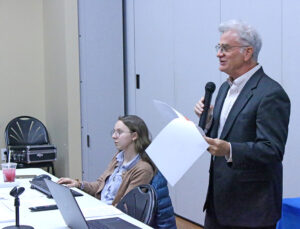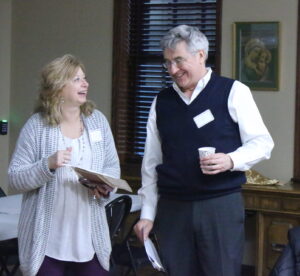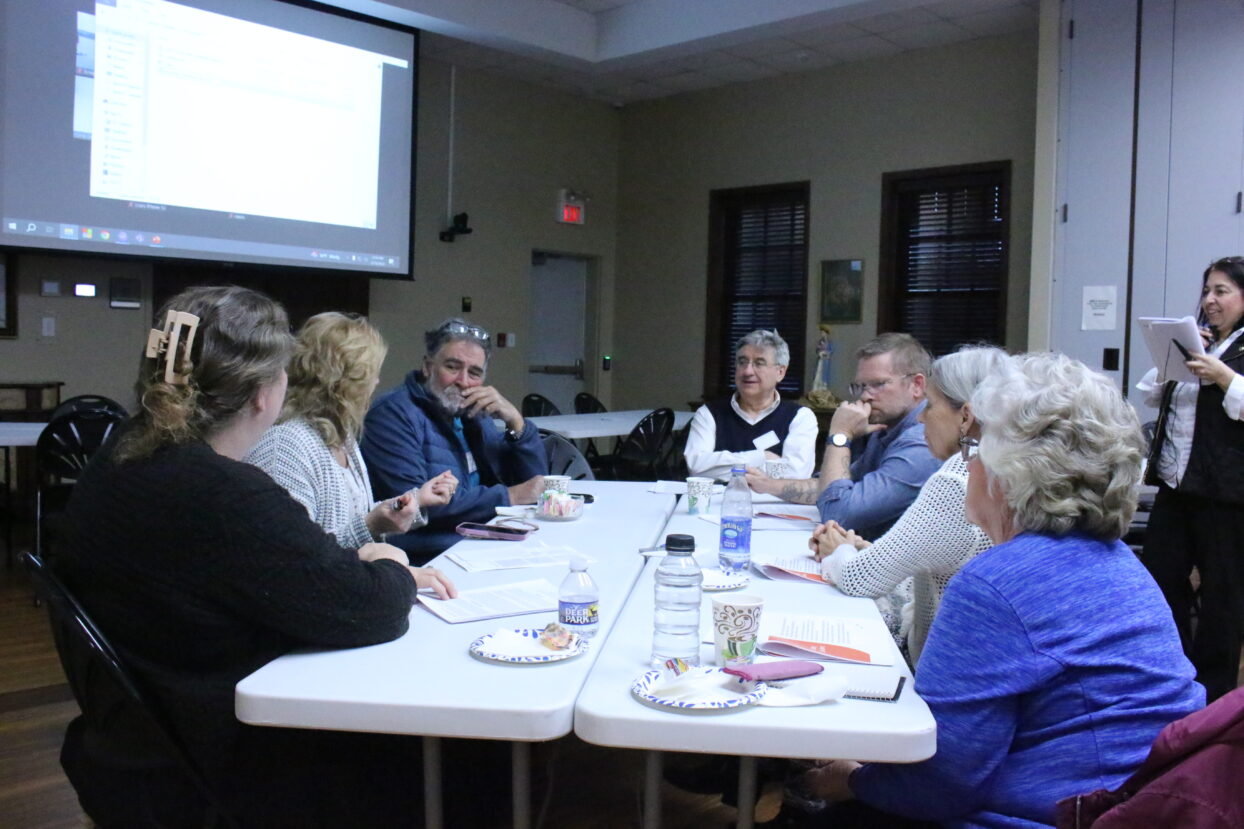Dialogue sessions hosted during Lent; diocesan report will be sent to the Vatican
By The East Tennessee Catholic
When Pope Francis called the Church to synodality three years ago, no one guaranteed the path would be certain. In January, dioceses in the United States were made aware of an unexpected round of local dialogue called for after the 16th Ordinary General Assembly of the Synod of Bishops concluded its session in Rome in October 2023.
With guidance and assistance from the U.S. Conference of Catholic Bishops, dioceses jumped into action—with most of them, including the Diocese of Knoxville, hosting their dialogue sessions during Lent.

Jim Wogan, Diocese of Knoxville communications director, speaks at the Synod dialogue session March 19 at the Chancery. Assisting him is Lizzie Morris, a student from the University of Notre Dame assigned to the diocesan Office of Youth, Young Adult, and Pastoral Juvenil Ministry. (Photo Dan McWilliams)
“Getting the sessions put together quickly presented a few challenges. Deciding how they should work and making sure people were aware were critical,” said diocesan communications director Jim Wogan. “Originally, we planned to have them in early March, but at the recommendation of a pastor, we moved them to mid-March. It was a good suggestion.”
The sessions in the Diocese of Knoxville were held on March 16 and March 19 at the Chancery office. Participants were able to join the discussion in person and online.
Referred to as the Interim Session of the Synod, the meetings were held almost two years after parishes, schools, and ministries conducted “listening sessions” that resulted in the Diocese of Knoxville producing a 10-page Synthesis Report that was delivered to the U.S. Conference of Catholic Bishops in May 2022. That report eventually made its way to be included in discussions during the 2023 General Assembly in Rome.
“We had a great response during the listening sessions in 2022, with more than 4,600 people participating in an online survey,” Mr. Wogan said. “Additionally, parishes, schools, and ministries conducted their own sessions, and the diocese, through Catholic Charities of East Tennessee, made a real effort to reach out to people living on the margins.”
The 2022 effort was led by Deacon Sean Smith, chancellor of the Diocese of Knoxville, and Lisa Healy, recently retired executive director of Catholic Charities of East Tennessee. Deacon Al Forsythe and Mr. Wogan organized the dialogue sessions for the Interim Stage.
Turnout in March was light but worth the effort, Mr. Wogan said.
“Participation was much less than we expected, but the conversation during those sessions was inspiring,” he said. “First, opposing views were voiced—but it was done in a thoughtful and civil manner. We’re so accustomed to social media these days where there’s no real human connection and a lot of anonymous anger. The people who participated in our sessions were considerate, articulate, had a deep understanding of our shared faith, cared about the Church, were respectful, and were not afraid to share their concerns. As a moderator, I didn’t participate, but hearing some of the discussion reaffirmed my personal faith in people and in the Church.
“Also, keep in mind that this session came a couple of years after we held the original local listening sessions. More than 4,600 people participated in the online survey back then, and many others participated in townhall-type meetings at parishes and schools. There were well-attended training sessions in Johnson City, Chattanooga, and Knoxville for volunteers who led the local sessions. So, overall, I think the diocese has had good participation.”
The sessions on March 16 and March 19 lasted close to two hours. Participants were updated on the Synod timeline, prayed an invocation to the Holy Spirit and then reviewed two “guiding questions” provided by the Vatican to help with the discussion:
- How can we encourage and enhance stronger relationships between the Church’s structures/organizations/ leadership/life of each baptized person that moves us toward greater unity as one body of Christ in proclaiming the risen Lord and His Gospel?
- Where have I seen or experienced challenges and/or difficulties within the Church that hinder the mission, and how do I think the Church can better address these challenges and difficulties?
After that, it was a wide-open discussion that utilized small groups rather than the townhall format used during the listening sessions in 2022.
“We had people attending from parishes in the diocese’s major population centers—Chattanooga, Tri-Cities, Knoxville,” Mr. Wogan said. “We also had participation from people at parishes in Rogers-ville, Maynardville, Dunlap, Athens, Fairfield Glade. There were laity, religious, clergy, and people of many age groups—young adults and older parishioners. The Office of Hispanic Ministry participated and helped translate for Spanish-speaking participants. In that regard, I think the diocese fulfilled the Holy Father’s goal of getting different voices.”
Just like in 2022, the diocese compiled notes and feedback from those who attended the sessions. The feedback was included in a brief three- to-five-page summary to the USCCB, which was due April 8. As the report was being completed, the preliminary review of the notes revealed a few trends.

Carolyn Krings, administrative assistant with the diocesan Office of Marriage Preparation & Enrichment, shares a laugh with P.J. Cowley of Immaculate Conception Parish in Knoxville during the Synod dialogue session March 19 at the Chancery. (Photo Dan McWilliams)
“Feedback touched on different issues and themes,” Mr. Wogan said. “Some of them were like the responses we received in 2022. People don’t like ambiguity. There’s a prevailing sense of frustration with this. Clearly, many people think the Church can manage itself better. Inclusivity, women deacons, and a concern that the pope is trying to change the Church were all mentioned. If the goal was getting everyone in the Church to discuss issues, this process seems to have done that.”
While turnout was lower than anticipated for the March sessions, those who participated engaged in back-and-forth discussion.
“I think some of the questions led us in that way, to look for places where things were going well and also look for places where things could be improved. I think that we had a lively discussion over there (at our table),” said Immaculate Conception parishioner P.J. Cowley.
“It’s always interesting listening to other people. You realize that other people have very different angles, approaches to their faith and to their community and how they participate in their church,” he added.
A parishioner from St. Mary in Oak Ridge thought the small-group format worked well.
“Absolutely. I did not know we were going to be doing that when I came in, but I thought that it was a great way to really get us talking, and having some people facilitate the questions I thought was great, too,” she said, requesting anonymity.
“We got to cover a lot of different issues, successes, and not-so-great things about the Church. We talked about how we thought that community was key, and learning about each other in our own parishes was a great idea, and we have room for improvement in that area. A lot of room,” she added.
The report to the USCCB, like all Synod documents, will be available on the Diocese of Knoxville website Synod page: dioknox.org/synod-2023.


Comments 1
Was there any talk about Jesus?